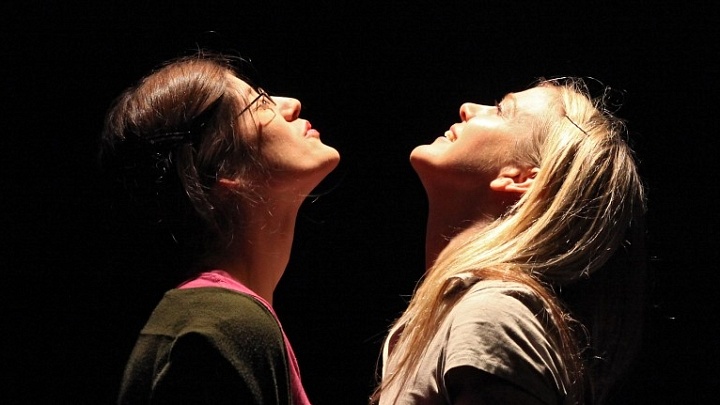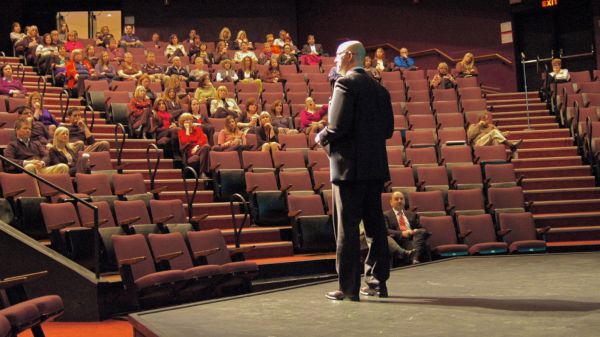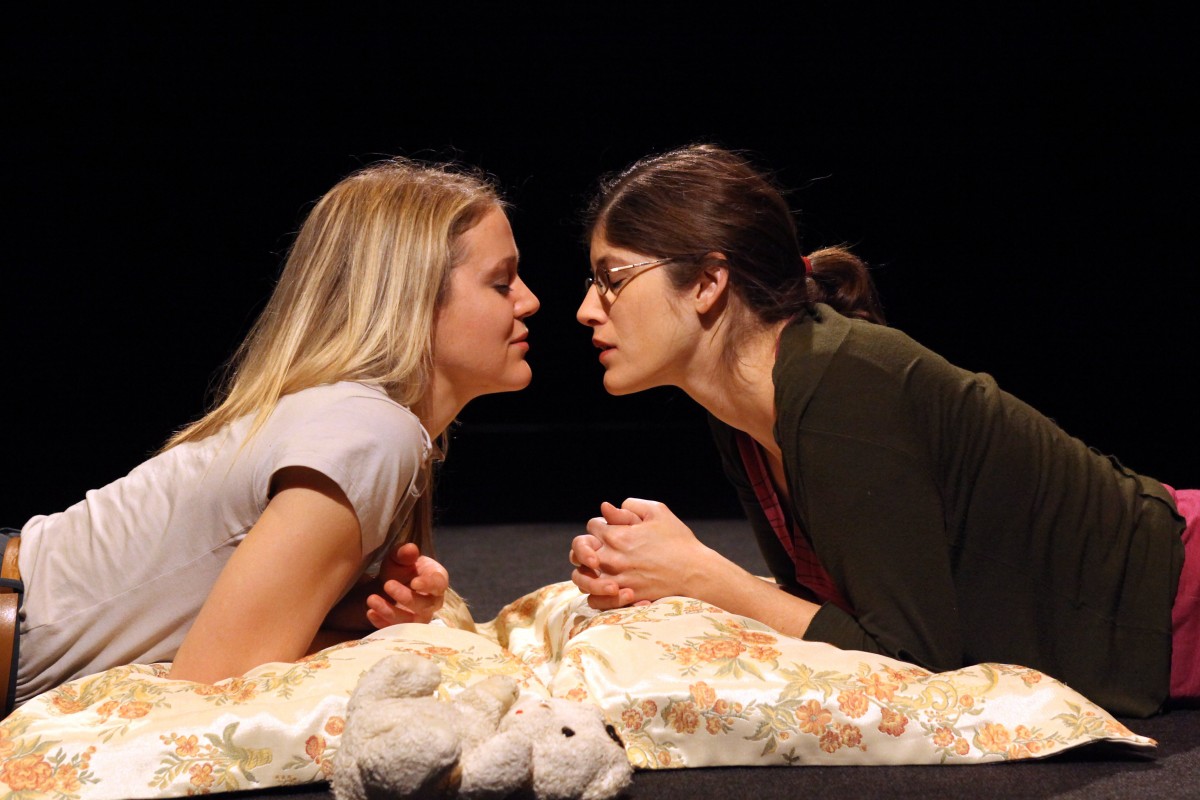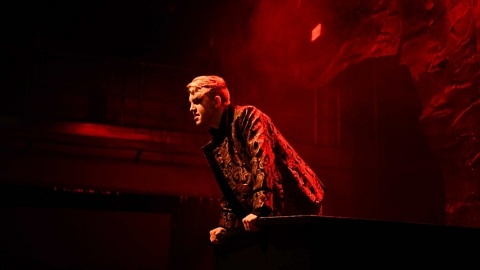Hello theatre creators, educators, scholars and everything in between! I hope you’re having a productive-yet-restful summer. Ever wonder what it’s like...
10 April 2014: This is a selection of the DARTcritics’ reviews of A Beautiful View.
Cassandra Moerman writes: Well, fans and friends, I went to see A Beautiful View by Daniel MacIvor, and let me tell you: the view was pretty incredible. Volcano Theatre put on this stellar performance in a section of the Sean O’Sullivan Theatre at Brock University. The audience was divided in half, each half on each side of the stage and I was so close to the people next to me, I could feel the hair on their arms. But this intimate space is exactly what drew the audience into the performance. We were forced to invest in the action on stage.
This play follows two women (one played by Becky Johnson, who is “full of personality” and incredibly engaging; and the other by Amy Rutherford, who is effortlessly hilarious and mesmerizing to watch) as they meet, and end up in bed together. However, the story does not end happily ever after there. First, there is a question of labels to bring up because:
“I’m not a lesbian”
“Neither am I”
These two women fall in love with one another, but societal norms and conventions prevent Johnson’s character from letting go of her own preconceived notions of how the world is supposed to work. MacIvor creates a commentary on love and on society as a whole. Why do you have to fit in a certain label (gay, straight, bisexual) in order to have a relationship with someone? Why can’t you just be with someone who makes you happy?
As the audience tries to work through the mystery of their developing relationship, there was no denying that there is a tangible chemistry between the two actresses. They fed each other energy and created something real on stage. I was thoroughly impressed with the skill and precision with which they performed. Their ability to stay in character and focused in such close proximity to the audience, with reactions coming at them from every direction, was remarkable.
The sound effects and music in the show took a life of their own. With a boom box onstage from the beginning, music becomes a central part of the feeling of the production. Composer and sound designer Krister Schuchardt does a great job in creating pieces that create moods and tones throughout the show. The sound also helps the audience respond on an emotional, inner level, connecting them to the characters’ feelings.
There were a couple of moments when I did get lost in the woods, though. A few times, the actresses broke out into intricate movement pieces. While these in themselves were beautiful, they did not make sense to me in the context of the production, and made me disconnect from the characters and the story, when I very much wanted to stay connected.
Despite this, A Beautiful View was amazing. It opened up many questions for me to answer – which is what good theatre does.
Kate Croome writes: Daniel MacIvor’s A Beautiful View is a stunningly simple piece of theatre exploring friendship, love, and all the grey areas in between. Volcano Theatre glorioiusly revives MacIvor’s 2005 script, and under Ross Manson’s direction, the show shines. It tells the story of two women who meet by chance in a camping store. They quickly discover they are kindred spirits, and before long their sudden friendship has culminated in a one night stand, the first lesbian experience for two otherwise “straight” women. Another chance encounter years later sparks a decade-long friendship filled with laughs, struggle, and confusion.
The two women are played by Toronto improv artist Becky Johnson and Volcano Theatre alumna Amy Rutherford. Both inhabit their roles perfectly and achieve harmonious balance together. Where Rutherford is stoic and strong, Johnson is quirky and lovably awkward. The chemistry between them is tangible and electric, though realistic dialogue is sometimes sacrificed in favor of quick, choppy exchanges. While the two actresses clearly work well together, at times they do not seem to be listening to each other. Both characters are unnamed, letting their actions and words speak for who they are. This is consistent with the play’s theme, as the women struggle with a label – a name – for their particular relationship.
This View is not what it appears on the surface: a simple love story between two sexually confused women holds deep and complex meanings about navigating relationships and identities in modern society. Is sexuality fluid? Do relationship labels really matter? Truly this is a story for our times. Music is employed effortlessly and effectively, including a goofy subplot about the girls’ failed ukelele band, ironically named “Uke-ular”. Neither Rutherford nor Johnson are trained singers and it shows, but it doesn’t matter; the music is beautiful for its poignancy and its truth. Munich-based composer Krister Schuchardt wrote the music, and it is hard to imagine it without his beautiful compositions. When Johnson sings a lone song with a simple guitar strumming in the background, the simple emotion in her singing made the hairs on my arms stand up. The production also includes several movement pieces that, while beautiful in terms of choreography, are perhaps too long for a narrative-heavy piece. I found myself waiting for the sequences to end so that I could find out what would happen next.
The audience at Brock was a mixed bag of young and old, male and female, student and professor, and this speaks to the universal appeal of the content matter. Truly sexual fluidity is a fascinating and universal subject, and MacIvor’s storytelling beautifully narrates a tricky subject. A Beautiful View doesn’t provide answers; in fact, it suggests that perhaps answers to life’s questions will never come. But View at least asks the right questions, and for that, it triumphs.
Angelina Colosimo writes: Walking into the Sean O’Sullivan Theatre felt different this time around. The stage was sectioned off into an alley theatre space (with the audience facing towards each other). It lay bare except for a silver boom box. The possibilities were endless. A Beautiful View written by Daniel MacIvor portrays the genuine humanity in love, loss, and reconnection.
Becky Johnson and Amy Rutherford portray two broken individuals. The character played by Rutherford is completely cut from the world, introspective and lost, stating boldly that she has no intentions of looking for friends. She blindly wanders through her life until one day, while shopping at a Canadian Tire, she meets the socially awkward yet friendly character played by Becky Johnson. We never find out their names, but director Ross Manson along with the actresses does not fail to produce deep insight into the psyches of these two women.
The two have completely opposite characteristics. Where one is overly concerned of what others think, the other is cool being herself – whenever and wherever. After a long night of talking and sharing insecurities about life, they end up taking each other to bed. This 65-minute performance perfectly encapsulates love and loss. They find they have many things in common such as having the same birthday and enjoying camping. But they also find out that they’re not who they initially claimed. Instead of being a bartender at an airport, one woman is actually a hostess. The other says she is in a band but later confesses that the idea was as far as that dream had gone. “Wishful thinking,” she calls it.
Neither labels herself as lesbian and one even states, “you have to be organized to be bisexual”. The play takes us through time. In their 20s and 30s these energetic and powerfully raw women have some laughs, date some men, and of course go camping. Rebecca Picherack’s expressive lighting creates a peaceful forest on the far wall, and no forest is ever complete without the sounds of nightlife and crickets. Composer and sound designer Krister Schuchardt works some magic with the aforementioned boom box. The music which initially seems to come from the machine itself then surrounds us during the movement-based scenes – I was entranced trying to figure out the technicalities.
This play will opened my heart to the endless possibilities of love, the joy of sharing moments with another human being, and the struggle with ourselves in finding our own values and strengths. This play is packed full with awkward moments and will keep a smile glued to your face. This was indeed a beautiful view.
9 April 2014: Michael Caccamo, Emily Ferrier, Nicholas Leno, Bri Lidstone, and Kendra Neaves write:
We were fortunate to engage with the rehearsal process of Volcano Theatre’s production of Daniel MacIvor’s A Beautiful View. The research that we have conducted via interview—and through participation in a warm up with the cast and crew—informs our unique viewpoint on the nature of this traveling Canadian production.
On March 27th, we walked into the darkened Sean O’ Sullivan (S.O.S.) theatre for the dress rehearsal and were immediately disoriented. The S.O.S., a theatre we have performed in and grown accustomed to over our three years here at Brock, was a shockingly different space. Five long brown panels divide the stage area from the large sea of seats that makes up the S.O.S. theatre, and massive black drapes hung on either side of the stage, creating an enclosed and intimate environment. Thus what is normally a thrust configuration had been transformed into a stage within a stage – a grey carpeted platform with three rows of chairs on either side. The intimate space allows close proximity between performers and audience members; even after the performance begins the audience can see those seated on the other side of the stage. This arrangement cues us that we will be participating in an intense evening of self-analysis through a performance that breaks many rules of conventional staging. Through our discussion with the artists we discovered that the space was not the only intimacy that made A Beautiful View a success.
At the beginning of the rehearsal process for A Beautiful View, director Ross Manson worked alongside assistant director Clare Preuss to develop an exercise for the actors in which they identified key archetypes, which they then used in conjunction with the characters. From these archetypes, the creative team worked together to create a gestural vocabulary that they referenced throughout the process. The final product of this exploration becomes improvised movement sequences that occur several times during the 75-minute performance.
In addition to generating content for the production, this exercise was also useful in moving the actors out of engrained habits and into an exploratory state. Manson stresses that collaboration is the basis of exploration, particularly when working on a show that is intimate in its content. Creating trust and belief between the actors and among the whole team is essential. They must feel free to explore and make mistakes in the rehearsal studio.
This production premiered in 2012 at the Einstein Kulturzentrum in Munich, and was remounted by Volcano for this five-stop Ontario tour. In a post-show talkback, the actors stated that with this remount they have been able to explore the characters with a new level of comfort, to deepen the relationship between the characters of L and M. This show is about the most important aspect of life: human bonds, and what happens when we break them. The connection between the characters is so strong that even in death they are brought together; the actors must convey this connection with sincerity.
In his search for an appropriate cast, Ross Manson rarely auditions actors, and prefers casting individuals that he knows can work collaboratively. A Beautiful View is Becky Johnson’s theatrical debut. She is best known for being a stand-up comedian in Toronto. Her comedic timing and ability to push the jokes throughout the play encouraged Manson to cast her, despite her limited acting experience. In the run-through before the show it was clear that the actors felt comfortable with the material and that Manson felt confident in their ability to connect with audiences.
However, the nature of a touring show means the actors must adapt as audience receptions are always changing. Manson noted that audiences are more appreciative in Germany as evidenced by an average of six curtain calls at the end of the show, compared to an average of one or two in North America. In regards to the queer content of the play, Manson indicated that the audiences in Germany were more welcoming of the play’s themes whereas some of the small-town Canadian audiences varied in their receptiveness.
After Kingston, Milton, Burlington, and St Catharines, the company made their final appearance at the Capitol Centre in North Bay.
16 February 2014: The following article appears in the Spring 2014 issue of Centre Stage, the programme magazine of the Brock Centre for the Arts. It is written by the five #DARTcritics embedded in this production of A Beautiful View: Michael Caccamo, Emily Ferrier, Nicholas Leno, Bri Lidstone, and Kendra Neaves, who interviewed Daniel MacIvor via Skype in preparation for writing it.
Love and loss, light and dark – Canadian superstar playwright Daniel MacIvor puts it all on the table with A Beautiful View.
Produced by Volcano Theatre, A Beautiful View will entertain and confront Niagara audiences on March 27, at Brock University’s Sean O’Sullivan Theatre. The play was first produced in 2006 by MacIvor’s company da da kamera, and was part of an anthology of five plays that won him that year’s Governor General’s Award for Drama.
The play opens up with nothing but a boom box onstage playing the sounds of crickets chirping. This minimalist set provides the bare necessities to tell the story of how two women fell in and out of love.
When asked about his choice of setting, MacIvor explained, “There is something just beautiful about stripping a big theatre back to nothing.” But don’t be too quick to judge a book by its cover: this play is more complex than it initially seems.
According to MacIvor, “the play insists that [the audience] label what their experience is going to be based on the first three minutes”; but what follows challenges these initial assumptions. MacIvor’s ulterior motive are the tough questions: “What is a label?” and “Why label?” His characters evade any easy attempt to classify them; it is their experiences and the consequences of their actions that shape who they are.
Volcano Theatre transports the audience from spectator to participant, even allowing a select few to take part in the onstage experience. Under the direction of Ross Manson, MacIvor’s leading ladies, played by Becky Johnson and Amy Rutherford, test the waters of their relationship, allowing us to get up close and personal, leaving no stone unturned.
We have one woman, just referred to as L, who embraces the idea of not taking on a specific role sexually, while the other woman. M, feels compelled by the pressure of society to assume the “appropriate” sexual identity.
“That’s the tension that exists between them,” MacIvor explained. “That despite the fact they feel this incredible attraction to one another, and for all intents and purposes are a couple and for all intents and purposes are in love; one woman feels pressure to say ‘I can’t be a lesbian.’”
As a queer playwright, MacIvor mediates between gay and straight, reminding the audience that “in relationships, humans are humans and we relate.”
Why can’t a relationship simply be – without requiring an explanation? A Beautiful View may not provide a decisive answer, but the journey may challenge audiences in ways they never expect. Maestro that he is, MacIvor gives us avenues to explore; but it is up to each of us to take that first step.
Related Posts
For nearly two years, theatre lovers have felt entrapped in their own little purgatories. Artists have been unable to perform on stages, and audiences been...
Frances Johnson graduated from the Department of Dramatic Arts in 2020 and was about to begin an internship at the Shaw Festival when the Covid-19 pandemic...
For nearly two years, theatre lovers have felt entrapped in their own little purgatories. Artists have been unable to perform on stages, and audiences been...
Frances Johnson graduated from the Department of Dramatic Arts in 2020 and was about to begin an internship at the Shaw Festival when the Covid-19 pandemic...
Leave a Reply (Cancel Reply)
Twitter Feed
Blogroll
DARTcritics.com is partially funded by the Marilyn I. Walker School of Fine and Performing Arts, in support of student learning; experiential education; student professionalization; public engagement with the teaching, learning and production activities of the Department of Dramatic Arts; new ways of thinking; and the nurturing of links with our communities.








